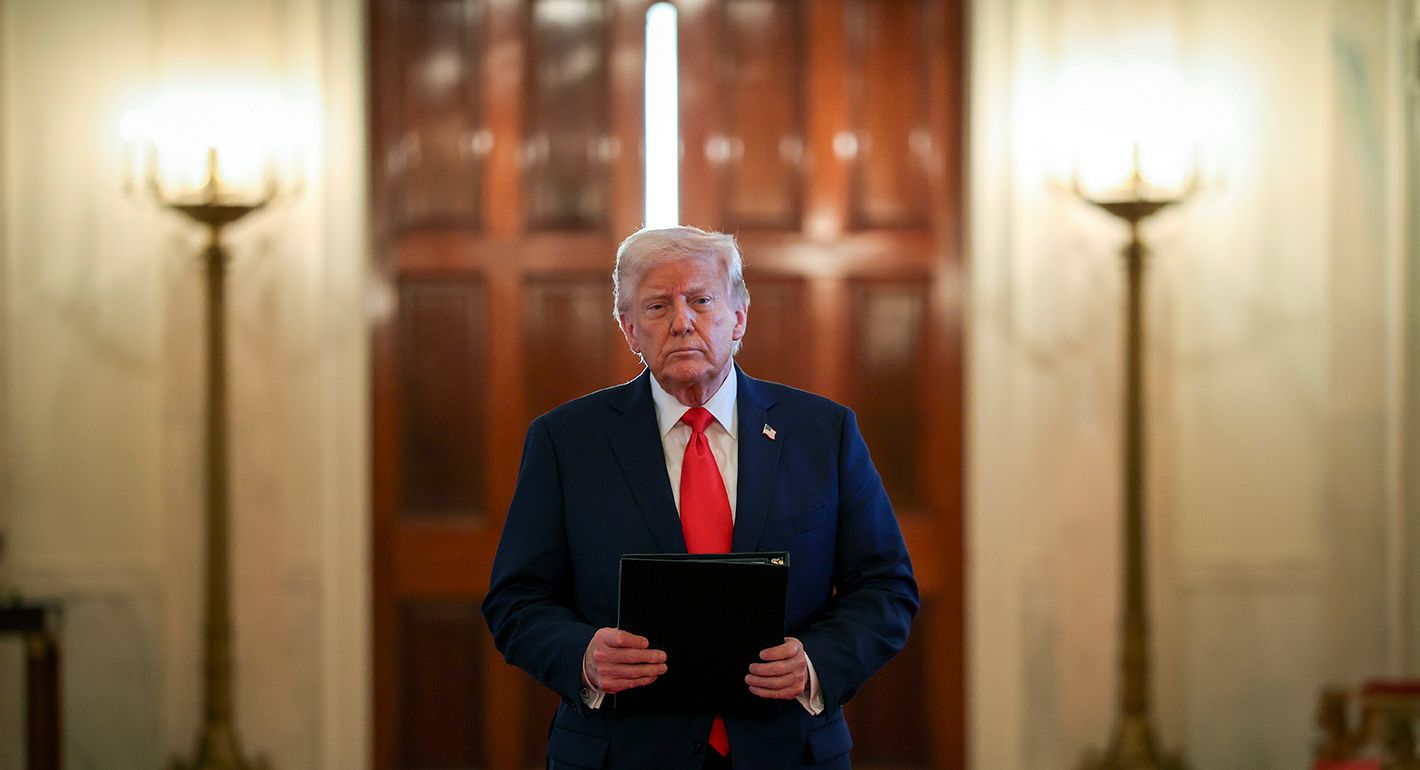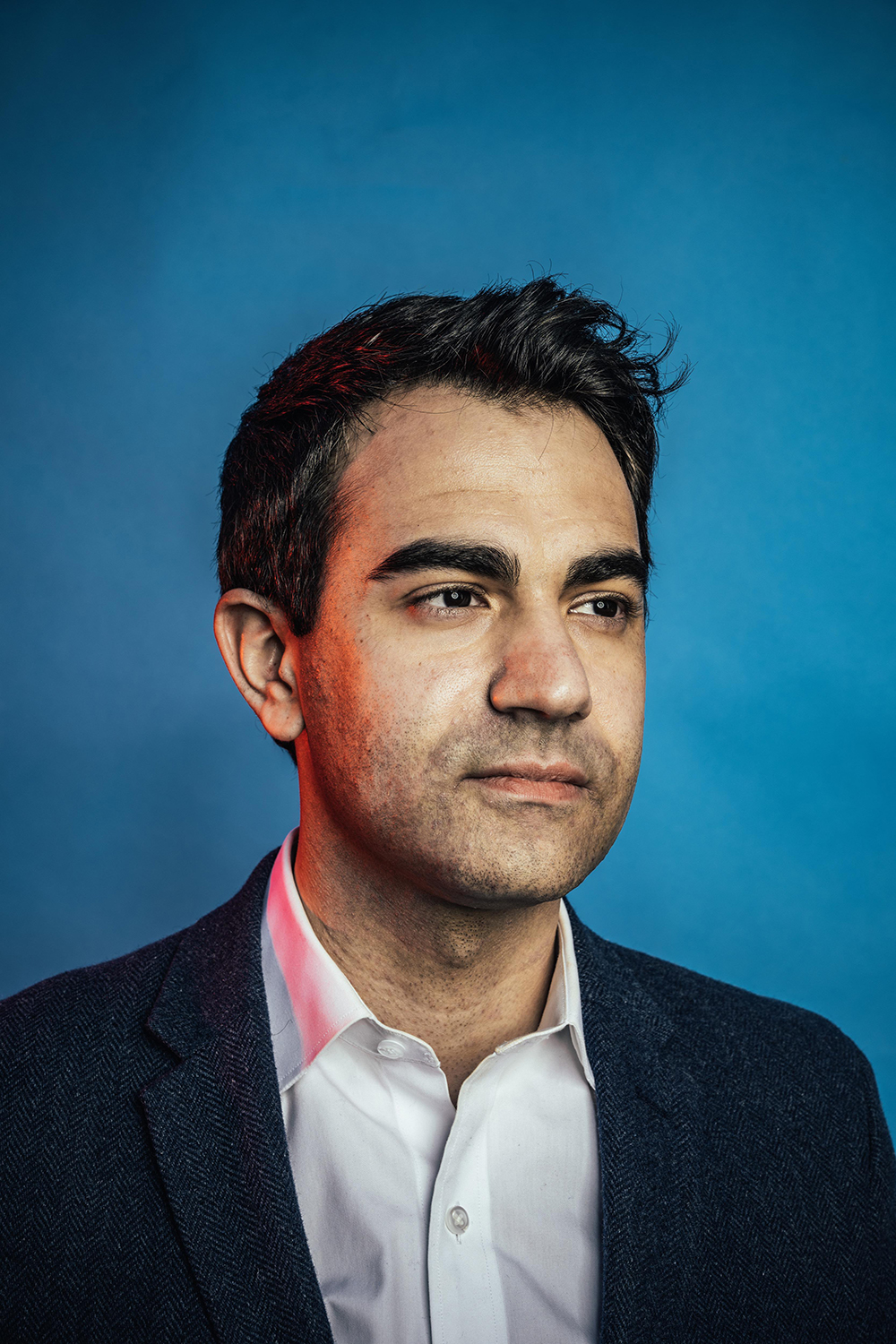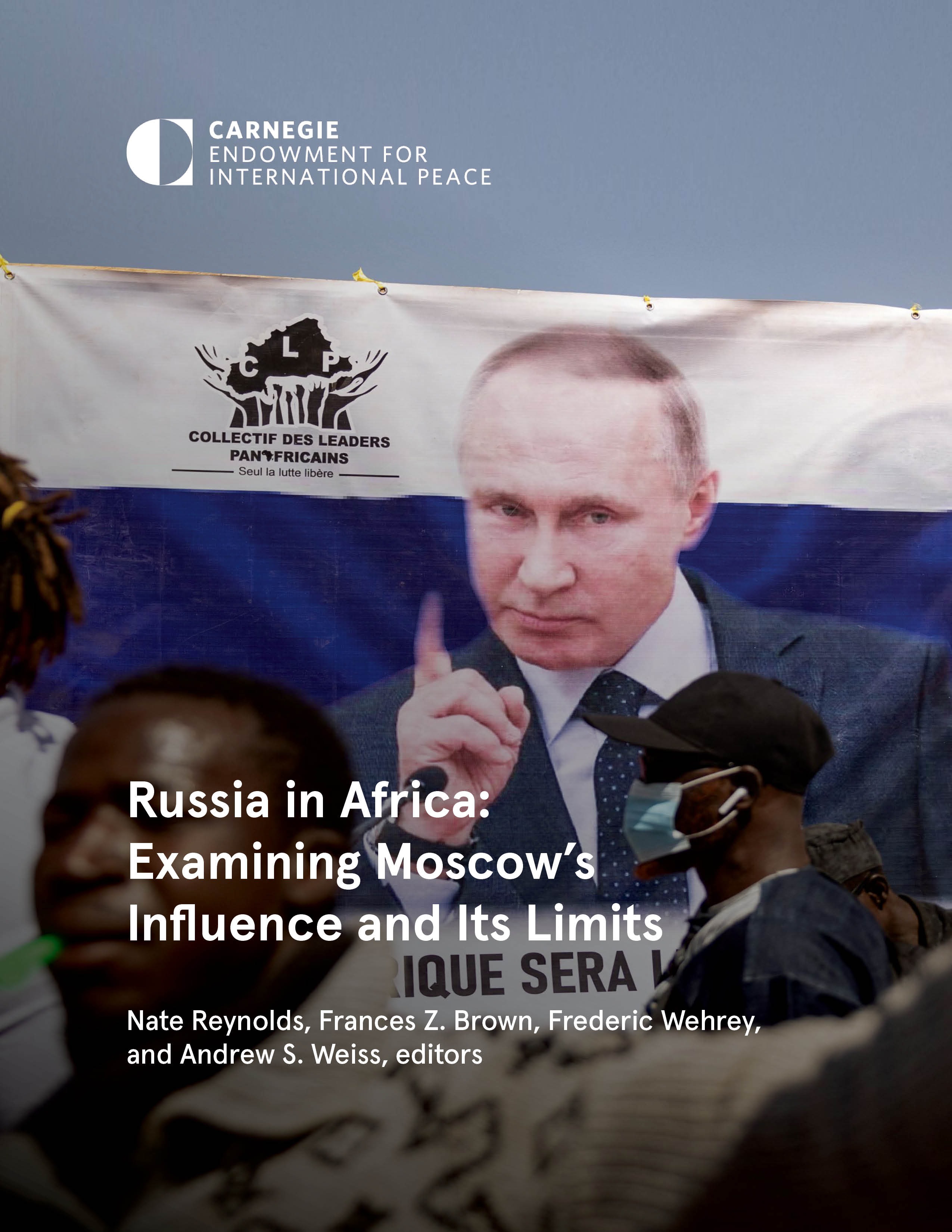- +18
James M. Acton, Saskia Brechenmacher, Cecily Brewer, …
{
"authors": [
"Stephen Wertheim"
],
"type": "other",
"centerAffiliationAll": "dc",
"centers": [
"Carnegie Endowment for International Peace"
],
"englishNewsletterAll": "americanStatecraft",
"nonEnglishNewsletterAll": "",
"primaryCenter": "Carnegie Endowment for International Peace",
"programAffiliation": "ASP",
"programs": [
"American Statecraft"
],
"projects": [],
"regions": [
"United States"
],
"topics": [
"Foreign Policy"
]
}
Source: Getty
Trump’s Foreign Policy: “He Wants to Turn the Tables, Not Leave the Room”
For historian Stephen Wertheim, Donald Trump is not at all an “isolationist.” His goal is for “the United States to benefit from its interactions with the outside world.” Will he succeed?
This interview was originally published in French by L’Express on April 17, 2025, and appears here in English translation.
Alix L’Hospital, L’Express: Donald Trump is often portrayed as an apostle of isolationism, the foreign policy of interfering as little as possible in world affairs. What do you think?
Stephen Wertheim: Trump is not an isolationist. This idea is wrong for three reasons. First, he is obsessed with “taking back” what has supposedly been stolen from Americans by the rest of the world. This idea implies that the United States must regain wealth and control, and therefore actively participate in world affairs. Trump’s goal is for the United States not to be isolated, but rather to benefit from its interactions with the outside world. He wants to turn the tables, not leave the room.
Second, on a more practical level, Trump inherits an American foreign policy that is globally postured, with far-reaching alliances and a large military presence. Americans are used to playing this role. So even if, in his heart of hearts, Trump wanted the United States to play a lesser role in the world, he’d have to do a lot to change that dynamic. That couldn’t entirely be accomplished in four years, and would in any case involve great risk and cost to achieve an isolationist end-state.
Finally, if we think back to the first group of Americans who were described as “isolationists” in the 1930s and 1940s, they defined themselves by their advocacy of a hemispherically bounded defense perimeter for the United States. They believed that, while the United States should keep outside powers out of the Western Hemisphere, it didn’t need to go any further to ensure the security and prosperity of North America. Personally, I don’t like the term “isolationist” to describe them: they wanted the United States to be the supreme military power over a large portion of the earth, and many supported nonmilitary forms of engagement, including trade, as universally as possible. But even if we were to take these people as the benchmark of isolationism, Trump is nothing like them. He has never proposed any other conception of what America’s defense perimeter should be. In fact, he has in effect accepted the current global perimeter, although he has suggested a degree of indifference to the defense of certain areas such as Ukraine or Taiwan.
Trump did, however, threaten to withdraw U.S. support for NATO allies.
Trump has not made clear that he will not defend European NATO allies. Certainly, I doubt he would. But I also doubt that presidents other than Trump, including President Biden, would have come to the all-out defense of the Baltic states in the event of an attack by Russia. In fact, Trump has not left NATO, nor has he clearly stated that he would not respect Article 5 of the North Atlantic Treaty. What he has said repeatedly is that if a country doesn’t pay its so-called NATO dues, i.e. if it doesn’t devote a certain share of its economy to its military, Trump might not defend it. And in reality, many of the countries most threatened and closest to Russia are also those that spend the most on their defense, precisely because of their vulnerability. Finally, a hundred thousand American troops are still in Europe and although Secretary of Defense Pete Hegseth indicated that he seeks to reduce the U.S. military presence on the continent, Trump has not been clear on this point.
Aren’t you a little optimistic?
I agree that Hegseth suggested that he intends to reduce the U.S. military presence in Europe and move toward European ownership of European defense. But we’ll have to see what the administration as a whole decides. Yes, it may pull back from European security over the next four years. I doubt there will be a full U.S. withdrawal from the region. Hegseth himself did not call for that. But even if the United States gets out of the business of European security completely, would this mean that Trump’s vision is isolationist? No, that idea comes from a Eurocentric perspective. I can’t see any scenario in which the United States would simultaneously withdraw from Asia, for example. So the United States would still be the world’s leading military power.
For the time being, Trump seems to be struggling, to say the least, with Russian President Vladimir Putin complicating negotiations for a settlement of the war in Ukraine, having recently bombed the town of Sumy. Do you think the American president is capable of bringing this conflict to an end, as he promised during his campaign?
The main question is not Trump’s ability, but whether the parties themselves, Russia and Ukraine, can agree to stop fighting. I doubt it at the moment. Russia’s price is high. Vladimir Putin seems convinced that he can make gains over time, and perhaps even completely defeat Ukraine in the end. Russia does, after all, have the upper hand on the battlefield. For its part, Ukraine until recently harbored unrealistic hopes. It is realizing now that it will not be able to get everything it wants from a settlement, such as NATO membership or a similar security guarantee involving the United States. So I suspect it will take time to determine whether it will be possible to reach an agreement. And then, we come to the Trump factor.
What does it imply?
To be fair, he deserves some credit. He has forced Westerners who refused to think seriously about ending the war to confront the issue, and he has at least started a dialogue with Russia and Ukraine about ending the war. That said, Trump may be impatient to get an agreement. The U.S. president could therefore overreact if a settlement is not reached quickly. He could then abandon Ukraine altogether, or—possibly—step up the pressure on Russia and escalate the conflict. Much depends on whom Trump blames for the failure of a peace deal.
The other problem is that Trump isn’t very good at persuasion. Any peace agreement in Ukraine will not resemble everyone’s idea of perfect justice; the pill will be hard to swallow. Ukrainians, Europeans, and Americans will have to be convinced that this is a good deal for Ukraine, given the circumstances. That challenge would have confronted Kamala Harris had she been elected president. The trouble is, many people in Europe, and also some in Washington, suspect Trump of having sympathy for Vladimir Putin. And Trump seems unwilling to take a vigorously pro-Ukraine stance.
As far as tariffs are concerned, we note the absence of Russia among the countries targeted by the increase in American tariffs. How can this be explained?
I think Trump wanted to separate relations between the United States and Russia from his tariff measures in order to prioritize finding a settlement for the war in Ukraine. He has already threatened to intensify sanctions on Russia. That said, he did impose a 10 percent tariff on Ukraine. So it’s not entirely clear why he exempted only Russia from this round of tariffs, even if his priority is to end the war. According to some American officials, he exempted Russia because that country is already heavily sanctioned and does not trade much with the United States. But Iran also faces strict U.S. sanctions and was made subject to 10 percent tariffs. So I can’t fully explain it, but this administration hasn’t always acted consistently.
Trump’s number-one target for tariffs remains China. How do you understand the American president’s strategy?
Trump’s objective toward China is, to put it mildly, not clear. On one end of the spectrum of possibilities, he may want a trade deal, much like what he tried to negotiate toward the end of his first term in office. If that’s the case, then his ultimate aim may be to have robust U.S.-China ties while reducing the bilateral trade deficit to some extent and also to improve specific Chinese actions, for example to reduce China’s export of precursor chemicals used to manufacture fentanyl. But if that is Trump’s aim, I fear he has misjudged the best way to deal with Beijing, which does not like to negotiate under the kind of pressure Trump has applied. The other possible scenario is that Trump seeks to “decouple,” to sever economic ties with China. This remains possible, but the truth is likely somewhere in the middle of the two extremes. During his campaign, he said he wanted to impose 60 percent tariffs on everything China sends to the United States. A lot of people didn’t take him seriously. I still don’t understand why, because he was clear and consistent.
Whatever his objective, hasn’t he underestimated China in 2025, compared with 2018?
I’m afraid he has underestimated the extent to which China has expanded its economic toolbox compared with what existed during Trump’s first term. What’s more, the intense pressure the U.S. president has exerted through tariffs may push China to refuse to negotiate. Therefore, if the United States and China are to find a way to defuse the crisis and reach an agreement, I fear it won’t happen quickly and will take a great deal of sustained effort that will have to overcome domestic pressures on both sides. The situation is worrying because the high level of tariffs currently in place almost amounts to a bilateral embargo.
Could Taiwan bear the brunt of this Sino-American duel, becoming a proxy battleground?
Trump could potentially play the “Taiwan card” to negotiate with China on trade or other issues. He could, for example, start hinting that he intends to recognize the island’s independence. Fortunately, he didn’t do that in his first term. He seems to understand how explosive the issue is for China. But if he made such threats this time, it would be very dangerous. The other possibility is that Trump could propose giving China new assurances on Taiwan, intended to show that the United States continues to abide by its One China policy and restrain Taipei from making unilateral changes to the status quo.
Let’s be clear: Trump could go too far and abandon all support for Taiwan, because what matters most to him is not geopolitics, and even less protecting democracies abroad, but rather trade. However, there are ways Trump could usefully provide assurances to Beijing. He could affirm that the United States does not support Taiwan’s independence and show that he will not cross China’s red lines. Beijing would then have less reason, or less justification, to step up its military operations around Taiwan, and the risk of a catastrophic war could be reduced.
Trump has done an about-face on the increase in tariffs affecting Europe in particular, bringing them down to 10 percent. Should the Old Continent be worried about a new U-turn?
Trump’s oldest and most consistent foreign policy belief is that the United States is being ripped off by its allies. He has repeatedly stated, including recently, that the EU was created to take economic advantage of the United States. The fact that he has backtracked on certain tariffs doesn’t mean he won’t impose them later. Trump also postponed some of his tariffs on Mexico and Canada, before reimposing them again. So I wouldn’t be too optimistic. I hope the Trump administration realizes that it is asking a lot of Europe. It is asking Europe to take the lead in defending Ukraine and perhaps in defending European territory more broadly, even though European economies have been slower to grow than they should be. But I wouldn’t bet that Trump is concerned!
Couldn’t Europe come out on top in this Sino-American duel?
Europe has cards to play in this trade war, but I think it will have to become more militarily independent of the United States in order to play them. Only then will it be able to credibly balance between the United States and other powers, and even oppose Trump’s bullying of Greenland and his support for European parties such as the Alternative for Germany (AfD). Europe needs to become capable of defending its members, with or without assistance from the United States.
As a historian, do you see Trump pursuing a steady line on foreign policy, or do you think, as some do, that the American president has no real strategy?
We have to take Trump seriously. The fact that some people keep using terms like “isolationist” about him suggests that they don’t take him seriously enough. He is intelligent and there’s a certain logic to his actions. If we see sustained policy shifts under Trump, the most likely areas to be affected are trade, European security, and Western Hemisphere relations.
That said, the paradox of Trump is that he’s heterodox in thought and action but highly tactical. He wants to be unpredictable and thinks unpredictability is a virtue. But that means Trump struggles to define a new direction for U.S. policy and stick to it. To make large-scale changes and achieve results over a four-year period, that’s what you have to do. Trump has yet to deliver radically different foreign policy results from his predecessors.
One of Trump’s most heterodox actions during his first term was to pursue direct diplomacy with North Korean leader Kim Jong Un. But he failed to propose a realistic basis for agreement or establish much of a diplomatic process. Since then, the United States and North Korea have not returned to the negotiating table. If anything, Trump has been even more tactically driven in the opening months of his second term.
What do you think will be the most burning geopolitical issue of this second term?
It’s tempting to say U.S.-China relations. These are the two greatest powers in the world. Clearly, trade tensions are sky high. There’s also quite a bit of uncertainty about what position the Trump administration will take on security in the Western Pacific, including Taiwan.
You used an interesting formulation: “most burning.” There are so many potential flashpoints. The war in Ukraine is unlikely to end this year. We could see an escalation over Ukraine or a complete defeat of Ukraine over the next four years. And the Middle East can never be ruled out as a source of burning issues. So far, negotiations between the United States and Iran seem to be on track, but Trump has set a deadline of two months for a new agreement, which is probably unrealistic. Perhaps he’ll extend it if negotiations look promising, but there’s still a real risk that Israel, with U.S. support, will launch an attack on Iran, which could lead to a wider regional war.
So what are you most concerned about?
The same thing that concerned me in the Biden years, namely that the United States, despite all the talk of reducing its military role in the world, has not acted on it. As a result of putting itself at the center of security arrangements in Asia, Europe, and the Middle East simultaneously, the United States is exposing itself to a host of problems in multiple regions that will draw Americans in when things go wrong. It is naive to believe that the United States can achieve “peace through strength,” as Trump says, if strength means spreading U.S. defense obligations and military forces so widely across the globe. If the United States is to achieve greater strategic discipline in its foreign policy, it will have to pull back from those parts of the world that matter less to U.S. interests, or where local actors can manage problems themselves. It remains to be seen whether Trump will improve on the record of Joe Biden, even if Trump sometimes seems to have a greater willingness to do so.
About the Author

Senior Fellow, American Statecraft Program
Stephen Wertheim is a senior fellow in the American Statecraft Program at the Carnegie Endowment for International Peace.
- Unpacking Trump’s National Security StrategyOther
- What Americans Think About American Power TodayPaper
Christopher S. Chivvis, Stephen Wertheim, Liana Schmitter-Emerson
Recent Work
Carnegie does not take institutional positions on public policy issues; the views represented herein are those of the author(s) and do not necessarily reflect the views of Carnegie, its staff, or its trustees.
More Work from Carnegie Endowment for International Peace
- Is a Conflict-Ending Solution Even Possible in Ukraine?Commentary
On the fourth anniversary of Russia’s full-scale invasion, Carnegie experts discuss the war’s impacts and what might come next.
- +1
Eric Ciaramella, Aaron David Miller, Alexandra Prokopenko, …
- Indian Americans Still Lean Left. Just Not as Reliably.Commentary
New data from the 2026 Indian American Attitudes Survey show that Democratic support has not fully rebounded from 2020.
- +1
Sumitra Badrinathan, Devesh Kapur, Andy Robaina, …
- Taking the Pulse: Can European Defense Survive the Death of FCAS?Commentary
France and Germany’s failure to agree on the Future Combat Air System (FCAS) raises questions about European defense. Amid industrial rivalries and competing strategic cultures, what does the future of European military industrial projects look like?
Rym Momtaz, ed.
- Can the Disparate Threads of Ukraine Peace Talks Be Woven Together?Commentary
Putin is stalling, waiting for a breakthrough on the front lines or a grand bargain in which Trump will give him something more than Ukraine in exchange for concessions on Ukraine. And if that doesn’t happen, the conflict could be expanded beyond Ukraine.
Alexander Baunov
- Russia in Africa: Examining Moscow’s Influence and Its LimitsResearch
As Moscow looks for opportunities to build inroads on the continent, governments in West and Southern Africa are identifying new ways to promote their goals—and facing new risks.
- +1
Nate Reynolds, ed., Frances Z. Brown, ed., Frederic Wehrey, ed., …


















